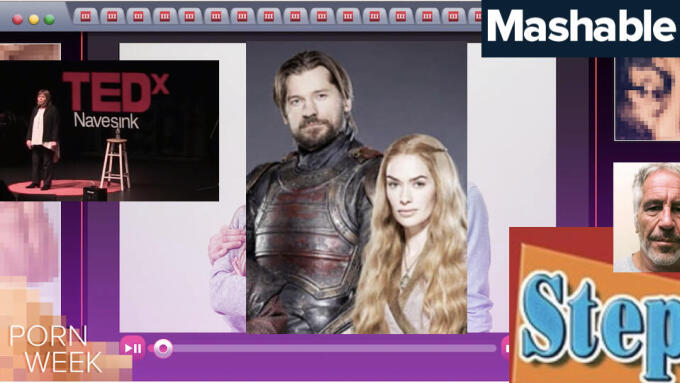LOS ANGELES — Mainstream entertainment and tech news site Mashable published in the last few days a series of articles centered around the adult entertainment industry under the banner “Porn Week.”
According to Mashable, this cluster of articles were commissioned because “August 8 is International Female Orgasm Day, and we're celebrating with an entire week dedicated to exploring the business and pleasure of porn.”
The articles, from diverse writers with diverse tones, covered a variety of topics, from the PR-friendly and stunty (an interview with Ryan Creamer, the “nice guy” comedian famous for posting wholesome videos on Pornhub) to the intriguing and original (a solid exploration of “the art of the porn GIF”) to informative surveys on adult industry issues that smart mainstream readers currently are asking about (the OnlyFans and camming phenomena, how studios are dealing with the pandemic, etc.).
But among all this laudable content, Mashable’s “Porn Week” also introduced some disturbing “pornsploitation” tropes. After all, the “August 8 is International Female Orgasm Day” schtick is not really meant to fool anyone savvy about digital content. Mashable’s “Porn Week” was really about shining a light on an industry that can be trusted to tantalize mainstream readers: if you put “porn” in the headline, they will click.
And one of the hallmarks of pornsploitation is “two-siding” the issue of sexual expression, implying there is always something shady, unsavory, disturbing and/or criminal lurking beneath anything that has to do with porn.
Mashable did this in the usual small ways — editorial word choices like the headline “The Disturbing Underbelly of the ‘Step' Porn Trend” — but also in a particularly egregious way: by extensively platforming anti-porn crusader Gail Dines.
A Militant Anti-Porn Crusader
The militantly anti-free sexual expression Dines was introduced in the piece about “stepfamily porn” — a topic that is regularly discussed in a smart, non-stigmatizing way by industry voices in private and in public — and was allowed to contextualize the issue in the most damning way possible.
Mashable's piece introduces the anti-porn advocate as “Dr. Gail Dines, professor emerita at Boston University's Wheelock College, and the president of Culture Reframed, a nonprofit aimed to address hypersexualized media.”
That’s a very euphemistic way of referring to Dines’ career — which includes collaborations with NCOSE, the well-funded, religiously inspired lobby (formerly known as Morality in Media) leading the current War on Porn — and describing Culture Reframed.
One of Culture Reframed’s leading mottoes is “solving the public age crisis of the digital age,” a direct reference to the discredited notion that “porn constitutes a public health crisis” which NCOSE — whose extremist definition of “porn” includes Sports Illustrated — has been pushing into State legislatures via evangelical, Catholic and Mormon legislators.
“Porn is ‘the public health crisis of the digital age,’” Dines’ group declares, citing widely debunked “research” supposedly showing “that porn undermines the social, emotional, cognitive and physical health of individuals, families and communities."
“But just as the tobacco industry argued for decades that there was no proven connection between smoking and lung cancer,” Dines’ group insists, in spite of the absurd analogy between watching something and ingesting something, “so, too, has the porn industry denied the existence of more than 40 years of empirical research on the impact of its products.”
Mashable allows Dines — whose views about free sexual expression are as extreme and biased as NCOSE’s and who has no actual knowledge of or data about digital content distribution in 2020 — to pontificate unchallenged about a number of issues regarding the adult industry.
TED vs. TEDx
Mashable precedes Dines' statements with a far-fetched theory by a researcher that “stepfamily porn” somehow took off because of the depicted subplots about incest in the HBO series “Game of Thrones.” Dines, the writer explains, fantasizes that since smartphones “allow for more privacy, whereas once you could only watch online porn on a bulky computer (at dial-up speed, no less), now you can take your phone to the bathroom and view whatever you want.”
“So it's far easier to indulge in something taboo,” the writer concludes based on her conversation with Dines.
At that point the Mashable article just morphs into parroting Dines’ peculiar notions and serving them up as fact.
“Porn looks the way it does today because of legislation,” the writer declares. “In 2002, Ashcroft vs. the Free Speech Coalition overturned the Child Pornography Prevention Act of 1996. This allowed performers to look under 18 in films even though they had to actually be 18. This sparked a flood of porn featuring performers that could pass for under 18.”
This curious theory is arguable, to say the least, and the only source provided for this is a 2015 TED Talk by none other than Gail Dines.
Dines theorized about this shift in that 2015 talk, available on YouTube, called “Growing Up in a Pornified Culture.”
“Growing Up in a Pornified Culture" is misidentified by Mashable as “a TED Talk.” It is actually a TEDx Talk, and there’s a major difference between the TED organization and the far less vetted TEDx groups, particularly in terms of speaker selection. Anti-porn crusaders like Your Brain on Porn’s Gary Wilson have benefited from the confusion over TED vs. TEDx giving their talks an aura of importance by associating it with the more prestigious TED brand.
But Mashable seems satisfied by Dines’ TEDx presentation and presents her views as factual. “So even though the performers are over 18,” Mashable writes, “they can often look well underage. And that unleashes a host of ethical (if not legal) issues. They're just that — performers. No one in these videos is likely actually related, as step-siblings or otherwise. None of it is real, obviously.”
“But that doesn't matter, according to Dines, ‘because the user is masturbating to images that he thinks is real.'"
“Pornographic images bypass the frontal lobe of our brains and go into a less rational part of the mind," Dines explained. "That means that even if we cognitively know what we're seeing isn't real, our less rational brain believes it is. And that's where the excitement comes from.”
Gail Dines is a retired professor of sociology and women's studies who taught at a now-dissolved Boston liberal arts college. She has no training in neuroscience.
House Lannister, Meet Jeffrey Epstein
The clincher for all this anti-porn/pseudo-science melange comes from another of Mashable’s peculiar sources, a tech journalist named Andrew Thomson, editor of a site called Components, who does not seem to have any direct knowledge of the adult industry, or of neuroscience.
Thompson, like Dines, also has notions and theories about adult entertainment, but his, crucially and sensationally, involve deceased, disgraced alleged pedophile Jeffrey Epstein.
Mashable rehashes something Thompson published in Components, stating that he “ventured to compare the 'step trend' to Jeffrey Epstein's guiding philosophy and reiterated it in his statement to Mashable. We consume video in ‘YouTube/Netflix mode,’ for example, bouncing from curated video to curated video fulfilling a shallow need for 'fresh' content. Sex is now in ‘Epstein mode,’ Thompson argued, transgressing to have sex with as many women as possible, as young as possible.”
Thompson elaborates on his “Epstein Mode” theory. ”The same operational rules that gave us Epstein also gave us a machine that generates seemingly infinite amounts of this material," he said.
Mashable joins the dots: “While porn is certainly not the same as sex itself, the idea is similiar [sic] — bouncing from video to video, performers as young and ‘fresh’ as possible.”
For Mashable “the perfect storm that Dines evoked — changing legislation, Game of Thrones, the human craving for novelty — has come to a head with 'step porn.'”
There is a perfect storm in Mashable’s “Porn Week,” but it has nothing to do with Jeffrey Epstein or George R. R. Martin.
It’s the perfect storm of endorsing the ridiculous “porn is a public health crisis” campaign and Dines’ fevered notions about an industry she loathes and has never bothered to understand, marrying it with some junk neuroscience by a tech journalist, adding medieval fantasy cable show lore and a dash of Netflix documentary fodder, and serving it up as clickbait during a slow Summer news cycle.








